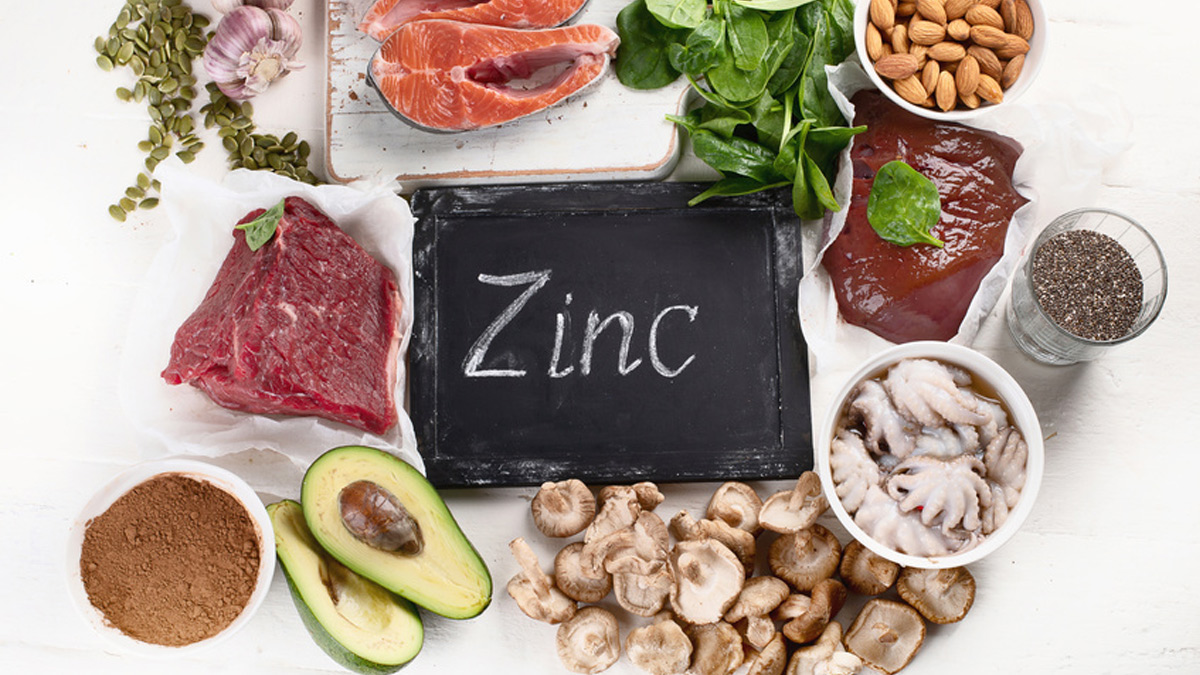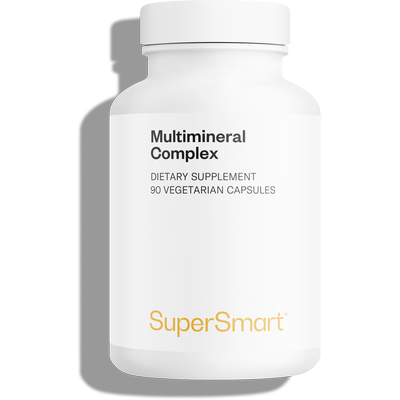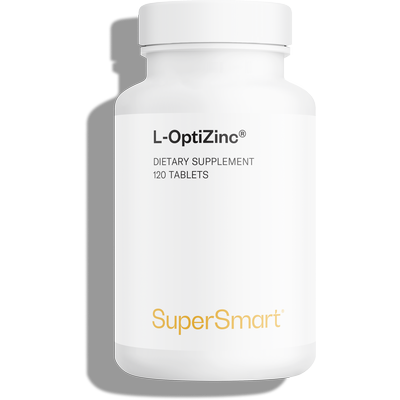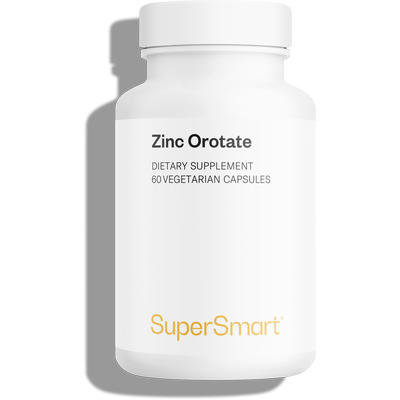All you need to know about zinc supplements!
Supplementing with iron, magnesium, calcium and potassium is perhaps more common than supplementing with zinc...

What is zinc? What is its role in the body?
Zinc is a trace element which is essential for hundreds of reactions that take place in the body. It is also necessary for the body’s defences and for maintaining healthy bones, skin, hair, nails and vision, as well as for mental function. In addition, it supports normal fertility and reproduction.
What are the body’s requirements for zinc?
Despite its importance to health, zinc cannot be stored by the body and therefore needs to be ingested daily from the diet, and if necessary, from zinc supplements. Needs can vary depending on several factors including gender, age and weight, as well as dietary intake of phytates. These are compounds found in certain plant-source foods which prevent zinc from being absorbed by the body. In 2014, the European Food Safety Agency (EFSA) established the following reference values for average zinc requirements:
- 7.5-11mg/day for males over 18;
- 6.2-8.9mg/day for females over 18.
Note: recommended daily amounts can vary depending on country and dietary habits.
What risks are posed by a deficiency in zinc?
A shortfall in zinc can have a negative impact on numerous physiological functions. Fatigue, vision problems, repeated infections, skin problems (dryness, acne, impaired healing, etc), brittle nails, and hair loss are among the symptoms of a lack of zinc. It can also affect fertility, particularly by reducing sperm count.Who is at risk?
Everyone needs a daily intake of zinc but some studies suggest that, for various reasons, a third of the world’s population does not consume enough of this trace mineral. Vegetarians and vegans are at particular risk here because zinc is primarily contained in meat and seafood. Zinc requirements also increase at certain stages of life. During pregnancy, for example, it is even more important to consume enough in order to ensure the healthy development of the baby. Finally, intestinal absorption of nutriments can be affected by several factors. Older people, those suffering from intestinal problems and alcoholics are particularly vulnerable to zinc deficiency.
What are the benefits offered by zinc supplementation?
Numerous scientific studies support the benefits of taking zinc supplements. Following analysis of various findings, health authorities have moreover recognised a number of health claims made for zinc supplementation. It appears to support the following functions:
- protein synthesis;
- normal DNA synthesis;
- cell division;
- normal metabolism of food, carbohydrates and fatty acids;
- normal metabolism of vitamin A ;
- normal acid-base metabolism;
- normal mental function;
- normal fertility and reproduction;
- maintenance of bones;
- maintenance of skin, hair and nails;
- maintenance of normal testosterone concentration in the blood;
- normal vision;
- normal immune system function;
- protection of cells against free radicals.
Which zinc supplement should you choose?
There are two possibilities: a highly-bioavailable form such as zinc orotate, or an enhanced combination product such as MultiMineral Complex. Nowadays, zinc supplements are not only taken to prevent or correct deficiency, but also to capitalise on the many benefits offered by this trace-element. Immunity, antioxidant defence, vision, skin … alongside these previously-mentioned virtues, the latest research suggests that supplementing with zinc may also help fight age-related macular degeneration (AMD), treat the common cold and even stop diarrhoea.
SUPERSMART ADVICE
References
- Mokhber-Dezfuli N, Saeidnia S, Gohari AR, Kurepaz-Mahmoodabadi M. Phytochemistry and pharmacology of berberis species. Pharmacogn Rev. 2014;8:8.
- Chen W, Miao YQ, Fan DJ, et al. 2011. Bioavailability study of berberine and the enhancing effects of TPGS on intestinal absorption in rats. AAPS PharmSciTech 12: 705–711
- Tan XS, Ma JY, Feng R, et al. 2013. Tissue distribution of berberine and its metabolites after oral administration in rats. PLoS One 8: e77969.
- Imenshahidi M, Hosseinzadeh H. Berberis Vulgaris and berberine:an update review. Phytother Res. 2016;30:1745–1764.
- EFSA opinion reference 2010;8(10):1734
- EFSA opinion reference 2010;8(10):1747
- EFSA opinion reference 2011;9(6):2207
- Feng R, Shou JW, Zhao ZX, He CY, Ma C, Huang M, et al. Transforming berberine into its intestine-absorbable form by the gut microbiota. Sci Rep. 2015;5:12155.
- Chang, W., Zhang, M., Li, J., Meng, Z., Wei, S., Du, H., et al. 2013. Berberine improves insulin resistance in cardiomyocytes via activation of 5=-adenosine monophosphate-activated protein kinase. Metabolism, 62(8): 1159–1167. doi: 10.1016/j.metabol.2013.02.007. PMID:23537779
- Yun S. Lee, Woo S. Kim,Kang H. Kim, Myung J. Yoon, Hye J. Cho, Yun Shen, Ji-Ming Ye, Chul H. Lee, Won K. Oh, Chul T. Kim, Cordula Hohnen-Behrens, Alison Gosby, Edward W. Kraegen, David E. James, and Jae B. Kim, Berberine, a natural plant product, activates AMP-activated protein kinase with beneficial metabolic effects in diabetic and insulin resistant states, Diabetes, 2006.
- Hu, Y., and Davies, G.E. 2010. Berberine inhibits adipogenesis in high-fat dietinduced obesity mice. Fitoterapia, 81(5): 358–366. doi:10.1016/j.fitote.2009.10. 010. PMID:19861153.
- Zhang, M., Lv, X., Li, J., Meng, Z., Wang, Q., Chang, W., et al. 2012. Sodium caprate augments the hypoglycemic effect of berberine via AMPK in inhibiting hepatic gluconeogenesis. Mol. Cell. Endocrinol. 363(1–2): 122–130. doi:10.1016/j. mce.2012.08.006. PMID:22922125.
- Ko, B.S., Choi, S.B., Park, S.K., Jang, J.S., Kim, Y.E., and Park, S. 2005. Insulin sensitizing and insulinotropic action of berberine from Cortidis rhizoma. Biol. Pharm. Bull. 28(8): 1431–1437. doi:10.1248/bpb.28.1431. PMID:16079488.
- Chang, W., Chen, L., & Hatch, G. M. (2015). Berberine as a therapy for type 2 diabetes and its complications: From mechanism of action to clinical studies. Biochemistry and Cell Biology, 93(5), 479–486. doi:10.1139/bcb-2014-0107.
Keywords
15 Days
Reliable delivery
Reliable delivery. Good product.
Viva
29 Days
Great service
Great service
cl
31 Days
Received product promptly and its early…
Received product promptly and its early days but seems to have improved my daughters alertness.
Anandi
41 Days
Amazing
Amazing, great product!
ALEX Sinclair
44 Days
Good products and Swift handling
Good products and Swift handling
Trusted
49 Days
I trust the company's product
I trust the company's products, the quality is trustworthy and the speed of delivery is also appreciated.
NAJIB Malaah
49 Days
Good job.
This company is serious when it comes to serving it's customers. They are fast to send out the orders. Their site is great and easy. Also, they treat their return customers with great deals and discounts. Keep up the good work.
ABDULQADER Jehad
51 Days
I know frech ( level 3 of 6) and can…
I know frech ( level 3 of 6) and can read your messages, but since order are official documents I'd like to have this in english. Merci Ursula Mathes
Ursula Mathes
54 Days
I worried the delivery.
Box was intact, content correct but delivery time was 12 days. I started to worry!
VIITANEN Esa
57 Days
Supply of Chondroitin 6-sulphate
The company has provided the required product efficiently with no complications.
OldBear
58 Days
Supersmart sell a lot of interesting…
Supersmart sell a lot of interesting stuff. More than jut the usual vitamins though they do all those as well. Ordering pretty straightforward - you may need to try a couple of times to get the offers to apply but they do work. I queried something and had a fairly quick sensible reply. Postage takes a couple if days but you do get good progress information. Very well packed. Bought from Supersmart a few times and will do so again.
AT Griffin
12 Days
Excellent
On m'a mis bien.
cliente
15 Days
qualité des produits et services
qualité des produits et services
denis riegel
16 Days
Nehme das Produkt noch zu kurz um eine…
Nehme das Produkt noch zu kurz um eine Bewertung abgeben zu können
Ermelinde
17 Days
Très satisfait
J'apprécie la facilité de navigation sur le site, le suivi des commandes, et bien sûr, la qualité des compléments alimentaires.
LE COUR SERGE






